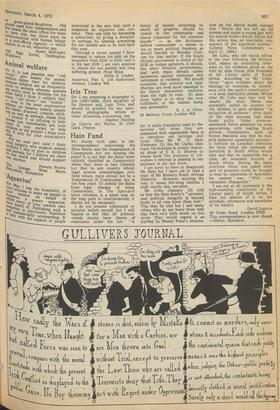Hain Fund
Sir: Surely both sides in the correspondence concerning the Hain family and the Suppression of Communism Act are missing the point? It is not that the Hains were unfairly classified as Communists when they were in fact Liberals; but that in any country whose legal system acknowledges civilised values, there should not be a Suppression of Communism Act in the first place. To defend the Hains from legal charges of being Communists, in The Spectator letter columns, is a small step on the long path to totalitarianism; it should not be necessary.
I do not possess communist or socialist beliefs myself, but I still happen to feel that all political creeds should have liberty of expression under the law. "A theory of society according to which all property should be vested in the community and labour organised for the common benefit" — as the dictionary defines communism — seems to me to merit political freedom; so should fascism or Monday Clubism for that matter. If the South African government is afraid of the KGB or violent agitators, it should, like other Western governments, deal with these threats under legislation against espionage and incitement to violence. We should remember that political and legal liberties are even more essential to the liberal democratic tradition than the right to vote. To deny these rights is to deny the true fulfillment of the human being and personality. R. J. A. Silver 30 Melbury Court, London W8 Sir: A tactic frequently used by the extreme left when they are presented with unpalatable facts is to introduce red herrings and trivia. Thus Mr W. V. Hain (February 12) like Mr Clarke (Janurary 14) indulges in closely reasoned abuse of S. E. D. Browne to whose book The Anatomy of Liberalism I referred in passing in one sentence in my last letter.
I am sorry to have to disappoint Mr Hain but I have yet to read a copy of Mr Brown's South African Observer. However, noticing the way it raises left-wing hackles shall rectify this omission. Mr Cohn (January 12) told us that the Hain family's "personal and political integrity is beyond doubt to all own knew them well." This may be true but I and many others who do not knew them well also have very little doubt on this score. They would regard it as typified by Master Peter's observa
tion on the Harris bomb outrage that "Harris did not kill an old woman and maim a young girl with his station bomb—South Africa did. His action was an inevitable consequece of the apartheid system." (Liberal News Commentary — April 11, 1969.) Mr Cohn, who left South Africa in the year following the Rivonia trial, makes an interesting reference to the evidence given at the trial by Alan Paton, then President of the Liberal party of South Africa. According to Mr Cohn, Paton "gave evidence about the ideology of terrorism in accordance with the party's constitution" — a most instructive phrase. Whilst what Mr Cohn says may well be nearer the truth, Paton was ostensibly called by counsel for the defence to give evidence "in mitigation of sentence" after eight of the nine accused had been found guilty. Under cross-examination Paton admitted his close associations with leading South African Communists such as Nelson Mandela and that he had, with apparent equanimity accurately forecast on Canadian television the form which the outbreak of terrorism in South Africa would take and that he supported, for a time, an economic boycott of South Africa. During the same interview Paton was asked what sort of pres3ure could be brought to bear by opponents of Apartheid; his answer was " Well, you remember Sharpeville."
I am not at all interested in the high-sounding constitution of the Liberal party of South Africa. I base my opinion of it on the activities, utterances and associates of its leaders.
David Lazarus 38 Cedar Road, London NW2 This correspondence is now closed. —Editor, Spectator.










































 Previous page
Previous page